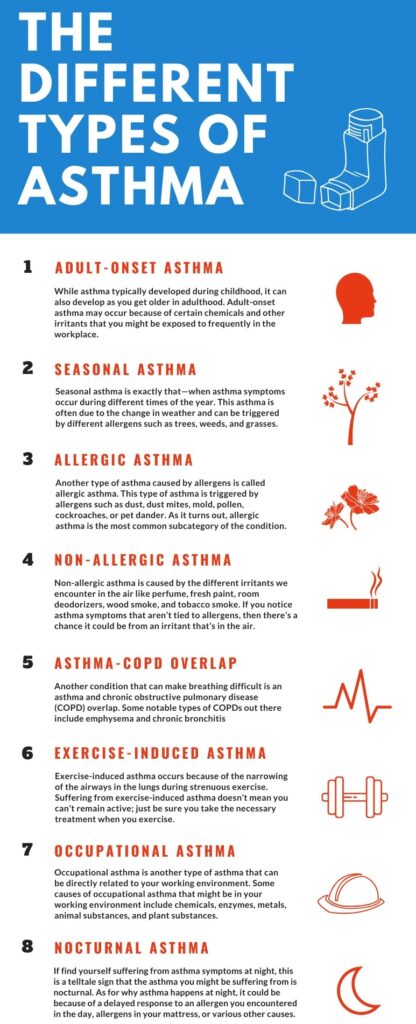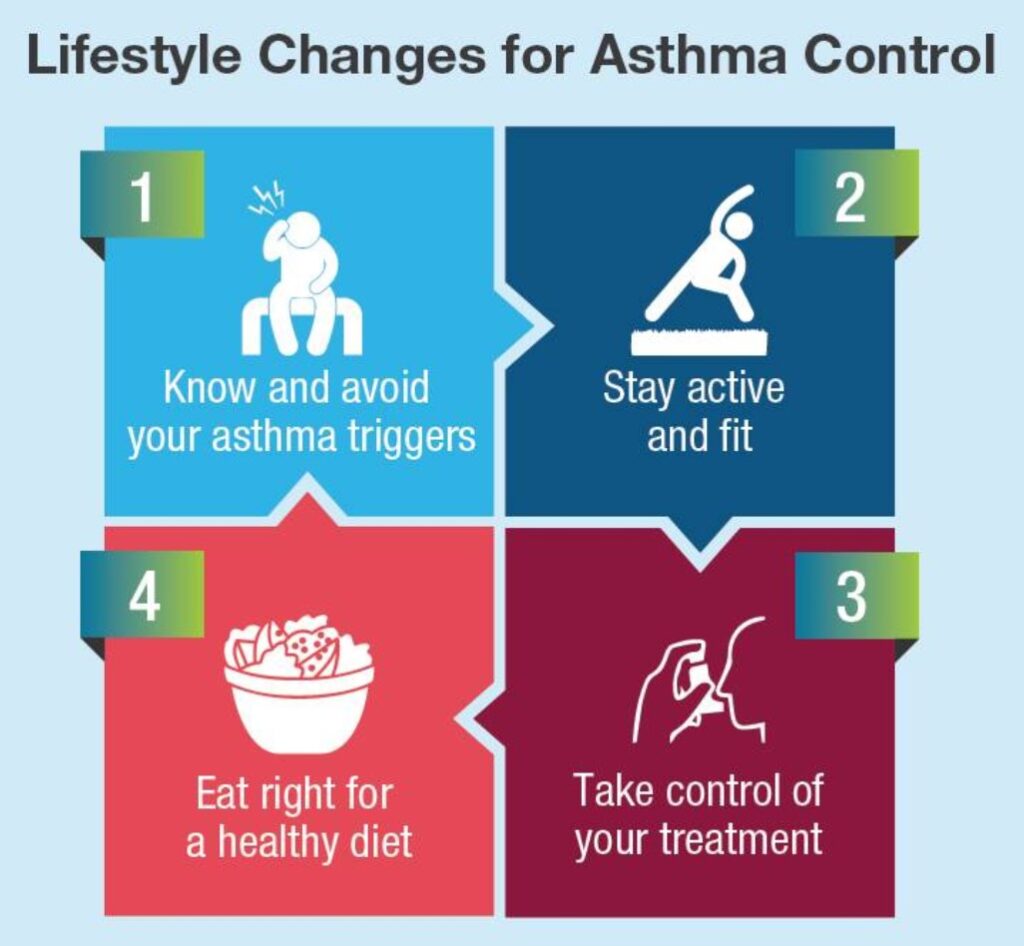
What is Asthma?
Asthma is a chronic disease that affects the lungs and airways causing airway inflammation. The inflammation makes the airway muscles twitch and this causes wheezing, chest tightness, and shortness of breath. It can be triggered by allergies, irritants or asthma triggers. Asthma can be mild, moderate or severe. People may develop Asthma at any time in their life.

Asthma in Malaysia is one of the most common respiratory diseases and it has been on the rise over recent years.
For some people with asthma, it is only a minor nuisance. For others, with severe Asthma, it can be a major problem that interferes with daily activities and may lead to a life-threatening asthma attack.
Asthma can be controlled, but unfortunately, it can’t be cured. The best way to approach this condition is through developing an understanding of what it is and what Asthma treatment you can use to control and relieve its symptoms.
This article, written by Dr. Nurul Yaqeen, an asthma specialist and respiratory therapist based in Kuala Lumpur, Malaysia, provides a good overview for those who are looking to learn more about asthma in Malaysia and how to manage their symptoms better.
What are the symptoms of Asthma?
Some of the common asthma symptoms include:
- Coughing especially at night or early in the morning
- Wheezing and shortness of breath, which is often worse when you exhale. You may also cough more during this time
- Tightening sensation on your chest accompanied by chest pain
- Tiredness and fatigue, which can be worsened by physical activity. This is more common in children with asthma symptoms than adults.

Asthma symptoms are often worse at night or during the early morning hours when you wake up because your airways narrow down as you sleep. The symptoms usually disappear once you take a deep breath.
What causes Asthma?
Asthma occurs because of inflammation process that happens in the airways and lungs.
It can get worse by infection and exposure to some stimuli or Asthma triggers.

Some of the common triggers include:
1. Airborne allergens, such as pollen, dust mites, mold spores, pet dander or particles of cockroach waste
2. Respiratory infections, such as the common cold
3. Physical activity
4. Cold air
5. Air pollutants and irritants, such as smoke
6. Certain medications, including beta blockers, aspirin, and nonsteroidal anti-inflammatory drugs, such as ibuprofen (Advil, Motrin IB, others) and naproxen sodium (Aleve)
7. Strong emotions and stress
8. Sulfites and preservatives added to some types of foods and beverages, including shrimp, dried fruit, processed potatoes, beer and wine
9. Gastroesophageal reflux disease (GERD), a condition in which stomach acids back up into your throat.
Is Asthma a genetic disease?
Asthma is not a genetic disease. However, genetics may play a role in how severe your asthma symptoms are and how responsive you are to treatment.
How is Asthma diagnosed?
Diagnosis can be done through a physical examination and medical history review by a qualified Asthma specialist. In some cases, you may need to undergo tests such as spirometry or peak flow meter readings in order to determine the severity of your asthma symptoms.
What are the different types of Asthma?
Your doctor will examine how often you have signs and symptoms, as well as how severe they are when determining the severity of your condition. The findings of your physical exam and diagnostic tests will also be taken into account by your Asthma specialist.
Common asthma types include:
- Allergic asthma
- Non-allergic asthma
- Cough-variant asthma
- Nocturnal asthma
- Exercise-induced bronchoconstriction
- Occupational asthma

Asthma can manifest itself in a variety of ways. You might have both non-allergic and nocturnal, for example.
Exercise-induced bronchoconstriction affects nearly everyone with asthma at some point.
Asthma can strike at any moment in life and cause a variety of symptoms. Childhood and adult-onset asthma aren’t technically categories; they just indicate when symptoms first appeared.
Some kinds are linked to a specific time in life. Children, for example, are unlikely to develop occupational asthma.
Your doctor will be able to pick the appropriate treatment to help manage your asthma based on its type and severity. Severity might fluctuate over time, necessitating therapy modifications.
Asthma severity may be divided into four categories:
- Mild Intermittent Asthma: Mild symptoms for up to two days and two nights each month.
- Mild Persistent Asthma: symptoms at least twice a week, but no more than once a day.
- Moderately Persistent Asthma: symptoms that occur at least once a day and more than once a week.
- Persistent Severe Asthma: Symptoms are severe and continuous most days of the week, and usually at night.
Can Asthma be cured?
There is no cure for, however, it can be controlled with asthma medicines and a good asthma management plan. Severe Asthma should never be taken lightly as it can cause a person to experience shortness of breath, chest tightness and wheezing. If left untreated, severe Asthma can also lead to more serious health complications. Speak to your doctor if you have any of these symptoms.
It is important to diagnose asthma as early as possible so that you can be put on the right asthma medications and monitor your condition closely. However, if a person suspects they may suffer from severe Asthma, it is best for them to visit their doctor first before self-medicating. This will help prevent further complications.
What are the risks of uncontrolled Asthma?
If it is not well-controlled, it can lead to a number of serious health problems, including:
- Increased risk of respiratory infections, such as bronchitis and pneumonia
- Increased risk of heart attack
- Increased risk of stroke
- Difficulty breathing that can require emergency room treatment or hospitalization
What are the short-term goals of asthma treatment?
The short-term goal of asthma treatment is to provide relief from asthma symptoms. This may mean asthma medications and using inhalers as needed, avoiding asthma triggers, and getting regular checkups. Patients should work closely with their doctor to come up with an asthma treatment plan that works best for them.
What are the long-term goals of asthma treatment?
The long-term goal of treatment is to try and achieve asthma control over the disease so patients can live normal lives with few or no symptoms. This means taking medication and using inhalers as prescribed, avoiding triggers, and getting regular checkups. In some cases, surgery may also be necessary to improve airflow in the lungs. People with asthma should work closely with their doctor to come up with an asthma management plan that works best for them.
How is Asthma treated?
There are a few methods of Asthma treatments.
They include:
- Control of environmental factors such as allergies, pets and cigarette smoke.
- Taking medications prescribed by your doctor which may include inhalers, tablets or liquids.
- Practicing pulmonary rehabilitation exercises under the guidance of a respiratory therapist to improve your breathing.
- Staying well hydrated.
- Avoiding smoking or being around smokers.
- Exercising moderately. This is especially beneficial for children with asthma symptoms.
- Using a peak flow meter and taking regular readings in order to monitor your symptoms at home for between one week and three months. This will help you assess whether the treatment is working effectively or not.
It is important that you work closely with your doctor because they can recommend newer Asthma treatments such as immunotherapy which may be available to you. Immunotherapy or allergy shots help your body become less sensitive over time which reduces the severity of your asthma symptoms and how often they occur.
All treatment options for Asthma can be very effective when used correctly by a patient who is committed in their care plan with their doctor or respiratory specialist. This means following the treatment plan, taking medications as prescribed, and avoiding known triggers. Asthma can be a manageable condition with the right treatment plan in place.
What are the types of Asthma medicines?
There are three main types of Asthma medicines:
Short-acting bronchodilator
This medication relaxes the muscles in your airways to improve airflow into the lungs. This type of drug is best used when an asthma attack occurs, or before you exercise/do strenuous activities. It can also help open up blocked airways.
Long-acting bronchodilator
This medication is taken daily to help keep the airways open. It helps prevent asthma attacks from happening.
Corticosteroids
This type of medication is used for severe asthma, and helps reduce inflammation in the lungs. This can improve breathing and reduce the number of asthma attacks.
There are also Asthma medicines that combine two or more drugs in one inhaler, so you can have fewer tablets to take daily.

What is the difference between a relief and rescue medication?
Relief Asthma medicines are used before an asthma attack occurs to try and prevent symptoms from starting, while rescue medications are taken during asthma attacks when patients have difficulty breathing. Relief inhalers help open up your airway by relaxing the muscles in your lungs so you can breathe easier. Rescue inhalers contain a short-acting bronchodilator that helps to quickly open up your airways and make it easier to breathe.
When should I use my Asthma medication?
The correct treatment is important for controlling your asthma symptoms and preventing future complications from occurring. Using your medication as prescribed by a doctor will help prevent asthma attacks from happening.
Short-acting bronchodilators should be used when you have an asthma attack, or before you exercise/do strenuous activities.
Long-acting bronchodilators should be taken daily to help keep the airways open.
Corticosteroids should only be used for severe cases of asthma.
What is an Asthma attack and how do I know if I am having one?
Symptoms of an asthma attack can include coughing, wheezing, chest tightness and shortness of breath. If you are having any of these symptoms, it is important to take action and seek medical help. An asthma attack can be a life-threatening event if not treated properly. It is important to know the signs and symptoms of an asthma attack and how to treat them.
What is the difference between an Asthma Attack and a Heart Attack?
Asthma attacks are characterized by shortness of breath and wheezing, while heart attack can be accompanied with these symptoms but also includes severe chest pain and possibly nausea/vomiting after eating certain types of foods.
What should I do if I am having an Asthma attack?
If you are having an asthma attack, it is important to take action and seek medical help. You can take over the counter medications such as a bronchodilator (such as albuterol) or an anti-inflammatory medication (such as corticosteroids). It is also important to use your inhaler properly. If your symptoms do not improve after using your inhaler, you should seek medical help.
What is the proper way to use a Metered Dose Inhaler (MDI)?
Before using your MDI, shake the canister well and check that you have an even number of “beats” by listening for at least two seconds after shaking.
To use:
Put mouthpiece between lips and inhale slowly, keeping your lips tightly closed around the mouthpiece. Hold breath for about 5 to 10 seconds after inhaling to allow medicine to reach deep into lungs.
Repeat this process twice more to get all of the medicine into your lungs. You should not breathe in too quickly or forcefully when using an inhaler because that could cause the drug to be released before it is completely inhaled.
What are some of the lifestyle changes I should make to prevent or reduce Asthma?
There are many ways that you can manage and treat Asthma in Malaysia. Lifestyle modifications can help your condition improve over time.

Some examples of these that can help relieve Asthma symptoms include:
Quit smoking
If you smoke, quitting will greatly benefit your lungs and reduce your risk of developing lung cancer in the future. This is especially important if you have been diagnosed with asthma.
Reduce exposure to allergens
If you have asthma, it is important to reduce your exposure to things that trigger an asthma attack, such as pet dander, dust mites, smoke and pollen. You can do this by:
-Washing your bed sheets and clothes regularly in hot water to kill any allergens
-Keeping your home clean and free of dust and pet hair
-Avoiding going outside when pollen counts are high
-Using a nasal saline spray to help clear your sinuses and reduce allergy symptoms.
Eat a healthy diet
A balanced, healthy diet can help improve asthma symptoms. Some foods that may help include:
-Oily fish, such as salmon and tuna, which are high in omega fatty acids
-Fruits and vegetables, especially those that are high in antioxidants
-Whole grains, like brown rice and quinoa.
Can I exercise with Asthma?
Exercise is a great way to improve overall health, but it can be difficult if you have severe asthma. You may wonder if you can still work out and exercise when you have asthma. The answer is yes – with proper asthma management, exercise can actually help control your asthma symptoms.
You should always check with your doctor first before starting any exercise regimen, but generally speaking, aerobic exercises that require you to breathe more deeply are the safest type of workouts for people who have asthma. Examples of these types of activities include running/jogging, swimming and cycling. It is also important not to overdo it when exercising because this can worsen asthma symptoms.
Conclusion
Asthma is one of the most common respiratory diseases in Malaysia and you may develop Asthma at any moment in your life.
If you suffer from asthma and haven’t found the right combination of treatments to achieve asthma control and relieve symptoms, it is important that you work with a doctor. There are many different treatment options for people who experience difficulty breathing because of their condition. Your doctor will be able to help select which one might best suit your needs. You should also practice some lifestyle changes and avoid smoke or secondhand smoke at all costs!
It can seem overwhelming trying to find the perfect Asthma control plan but don’t give up hope. As long as you remain patient and communicate regularly with your physician about how well things are working, there’s no reason why people with Asthma can’t lead healthy and productive lives moving forward.



































